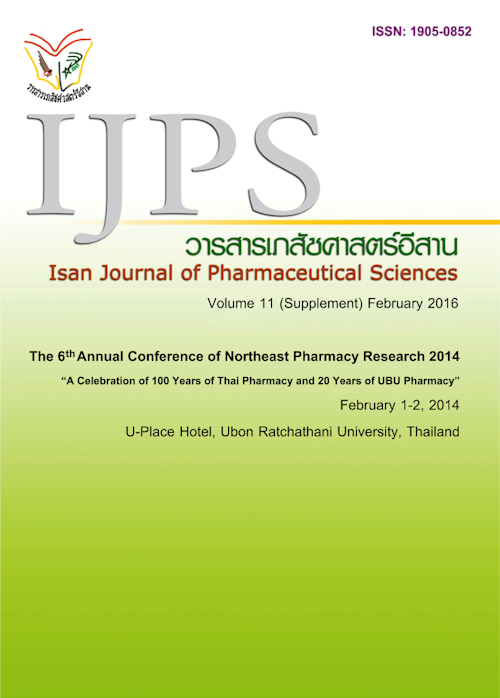Chemical and Physical Stability Study of Cefazolin Ophthalmic Solution for Extemporaneous Preparation Using Artificial Tear with Different Preservatives
Main Article Content
Abstract
Introduction: The drawback of cefazolin ophthalmic solution for extemporaneous preparations prepared in the hospital was theirs short shelf life (7 day) and the variation of used artificial tear. The purpose of this work was to study the effects of preservative types in artificial tear on the chemical and physical stability of cefazolin ophthalmic solution for extemporaneous preparations. Materials and method: Cefazolin ophthalmic solution (50 mg/mL) was prepared using 4 different types of commercial artificial tears as vehicles. Lac-oph® and Opsil tears® (formulation 1 and 2) contained banzalkoniumchloride as a preservative. Natear® (formulation 3) and Cellufresh® (formulation 4) used sodium perborate and oxychloro complex as preservatives, respectively. Formulation 5 and 6 was aliquoted with 0.015% banzalkoniumchloride solution and SWFI, respectively. All preparations were kept at 4°C and 30°C. The remained drug was determined by HPLC and the change in pH, color and odor was performed at day 0, 7, 14 and 28. Results: Storage temperature affected pH of formulation. In addition, more color changes, the related odor was observed. The color of all preparations was yellow after 7 days storage at 30°C and was brown when keeping for a longer period. After 14 days storage at 30°C, the percentage of drug remaining of all formulations was out of acceptable range of 89.06-108.83% regarding USP criteria. Whereas, that of the formulation 5 and 6 in which keeping at 4 °C for 28 days present out of range. Conclusion: The temperature, storage period and vehicle used affected the chemical and physical stability of cefazolin ophthalmic solution for extemporaneous preparations. Thus, they should be storage at appropriate temperature of 4oC and used the artificial tear as a vehicle. The artificial tear composed of sodium perborate is a proper vehicle which giving the preparation is highly physical stable.
Article Details
In the case that some parts are used by others The author must Confirm that obtaining permission to use some of the original authors. And must attach evidence That the permission has been included
References
Department of Medical Services, Ministry of Public Health: Statistical Report, 2011.
Pharmacopeial Convention. TheUnited States Pharmacopeia, the national formulary: USP 30, NF 25 2007. United States Pharmacopeial convention. Rockville (MD): The United States Pharmacopeial convention; 2007.
Rojanarata T, Tankul J, Woranaipinich C, et al. Stability of Fortified Cefazolin Ophthalmic Solutions Prepared in Artificial Tears Containing Surfactant-Based Versus Oxidant-Based Preservatives. Journal of ocular pharmacology and therapeutics 2010; 26: 485-490.
Rowe RC, Shesky PJ andEquinn M. Benzalkonium chloride. Handbook of Pharmaceutical Excipients (2009). 57. Trissel LA. Cefazolin Sodium. HANDBOOK ON INJECTABLE DRUG 2009. 800.


